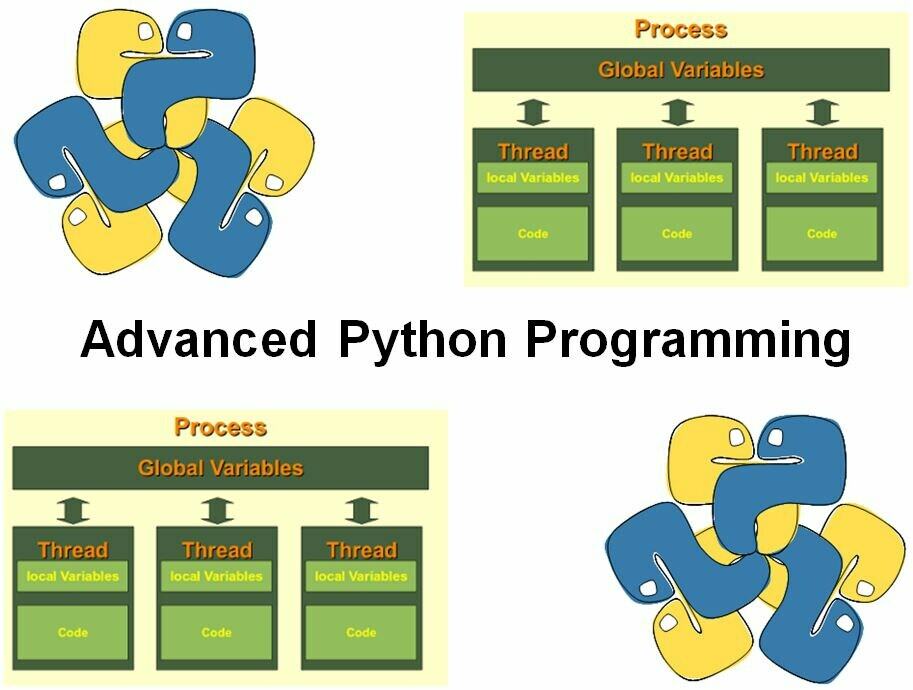-
Learning by doing
-
Trainers with practical experience
-
Classroom training
-
Detailed course material
-
Clear content description
-
Tailormade content possible
-
Training that proceeds
-
Small groups
The course Advanced Python Programming discusses advanced aspects of the Python programming language that simplify and accelerate the development of Python software.
In the first place a number of advanced aspects of classes are discussed such as multiple inheritance, polymorphism and operator overloading.
Subsequently attention is paid to the use of modules and packages and participants learn how to create packages themselves, how to upload and install them in a virtual environment. Accessing XML and JSON data is also on the program and it is discussed how logging can be implemented in Python programs.
Additionally iterators that deal with lazy evaluation are discussed as well as generators and coroutines with which concurrent programs can be made. Then decorators that are used to add functionality such as caching and proxying to existing functions and classes, are discussed.
In the module patterns the Python implementation of different standard Design Patterns is explained.
Next attention is paid to an advanced feature like meta programming.
Also the creation of processes and threads is discussed as well as the synchronization between threads and optimizing the performance of Python code. Subsequently the new asyncio module is on the course program with which asynchronous IO with futures can be realized. Inter-process communication via sockets and pipes is also treated.
And finally unit and mock testing is discussed in the context of test automation.
The course Advanced Python Programming is intended for Python developers who want to know more about the Python language and who wish to become proficient in advanced aspects of Python.
To participate in this course knowledge of and experience with programming in Python is required.
The theory is discussed on the basis of presentation slides. Illustrative demos illustrate the concepts. The theory is interspersed with exercises. The course material is in English.
Participants receive an official certificate Advanced Python Programming after successful completion of the course.

Module 1 : Advanced Classes |
Module 2 : Modules and Packages |
Module 3 : XML en JSON Access |
|
Classes Recapitulation Data Hiding Property Syntax Inheritance super Keyword Multiple Inheritance Constructor Chaining Checking Relationships issubclass and isinstance Overriding Methods __str__ and __repr__ Class Methods Operator Overloading Polymorphism |
import Statement from … import Statement Locating Modules Packages in Python Explicit and Implicit Import Namespaces and Scoping Test Harnas Virtual Environments and Activation Distribution of Packages Installing packages pip install Using Python Package index PyPI commands Uploading Package with Setup |
XML Parsing Pull versus Push Parsing Python XML Libraries DOM and SAX DOM Navigation and Manipulation XPath Minidom ElementTree Reading and Writing XML Searching and Validating XML XML Manipulation JSON library Dictionary to JSON conversion Loading and Dumping JSON |
Module 4 : Logging |
Module 5 : Generators |
Module 6 : Decorators |
|
logging Module When Use Logging Log Levels Logging Configuration Log in Multiple Modules Formatting Logging Logging Components Logger per Module Handlers and Filters Logging Flow Formatting Logger Adapter |
Iteration Iterables Iteration Protocols Supporting Iteration Generators Generator Functions Conveniant Iterator Generator Expression Expression Syntax Building Blocks Chaining generators Coroutines |
Functions as Objects Passing and Returning Functions What is a Decorator? Decorator Syntax Types of Decorators Passing Arguments Multiple Decorators Class Decorators Singleton Class Why Decorators Need for AOP Crosscutting Security Concern |
Module 7 : Patterns in Python |
Module 8 : Meta Programming |
Module 9 : Threads |
|
What are Patterns? Singleton Pattern Adapter Pattern Chain of Responsibility Pattern Observer Patters Patterns or Principles Everything is Object EAFP Duck Typing Monkey Patching Dependency Injection None Context Managers |
Classes as Objects Metaclasses Object from Metaclass Class of Class Descriptor Protocol Lookup Property Functions and Methods Classes and Types Object Creation Metaclass Singleton As Type Object Construction |
Thread Characteristics Threads in Python Current Thread Daemon Threads Joining Threads Derived Thread Class Signaling Threads Lock Object Locks as Context Managers Condition Synchronization Barriers Semaphores Thread Local Data |
Module 10 : Async IO |
Module 11 : Networking |
Module 12 : Unit Testing |
Concurrent Execution Multiprocessing Subprocess Scheduler Queue AsynIO Task Future Concurrent Futures Eventloop |
Network Layering TCP/IP Layering UDP versus TCP TCPv4 versus TCPv6 sockets Connectionless Services Connection Oriented Services Socket Utility Functions Asynchronous Servers Using Pipes Anonymous and Named Pipes |
What is Unit Testing? Automated Testing Test Driven Development Traditional versus TDD Unit Testing in Python Python Test Frameworks Test Cases Assertions Fixture Test Suite |
